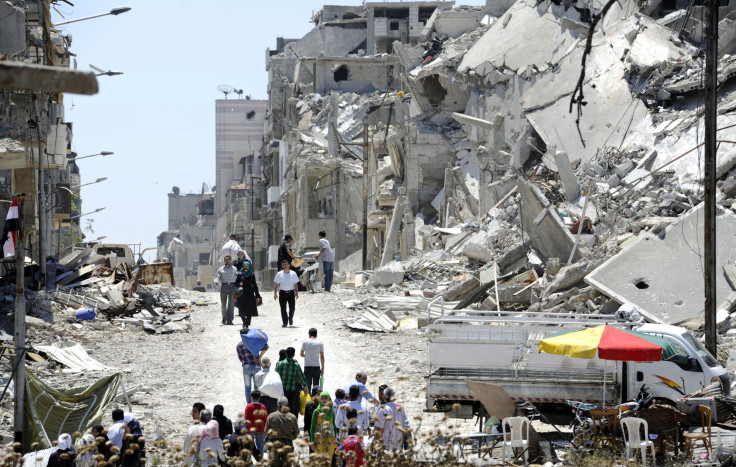With New Game, You Can Experience Toll Of Syrian War For Yourself

I have two options for entering Syria to report on the war and I have to choose one that will get me there safely. Go south into Syria through Lebanon, where I am based, or head north to Turkey and get to a border crossing in the eastern part of the country.
But I am not in Syria, nor am I in Lebanon. I am in a newsroom in New York City, playing 1,000 Days of Syria, a new online game created by Mitch Swenson, a student at Columbia College and a journalist who has traveled into the country to report for media outlets such as Vice News. The game launched last week and has garnered 150,000 views, with people playing from countries such as the U.S., the United Kingdom, Norway, Sweden, Serbia, Lebanon and Chile. But no one from Syria has played yet, Swenson said.
The game is named after an anniversary of the war: on Dec. 9, 2013, it had lasted for 1,000 days. It's not a game in the traditional sense, says Swenson, because there is no winner. It is simply meant to inform the player of the news, he said. Swenson plans to expand the game in the future to add more characters, including a figure from the Syrian government.
The war in Syria has killed more than 150,000 people and displaced close to 5 million, and throughout the three-year long conflict, the scenarios on the ground -- the fighting between the government and the opposition and the desperate living situation for civilians caught in the crossfire -- has changed drastically. The complex and constantly changing environment is difficult to understand for those who do not follow the story regularly, and the game is meant to help with that.
“The game personalizes something that seems very distant to a lot of people in America,” Swenson said. To people who know the region, it feels oddly familiar.
To me, having reported in Syria before, playing a virtual game about the war seems weird. As I begin the game, I have three options: I can choose to be a foreign journalist based in Beirut, a mother of two living in Daraa, or a rebel fighter living in Aleppo. I chose accordingly: foreigner.
The first scenario is a situation that I myself grappled with while reporting in the Middle East. Push ahead or stay behind? Go forward into the fighting, or stay where I knew I could get a ride out? During the first go-round with the game, I click through and make decisions based on my previous experiences. The game as a foreign journalist begins in Libya. I can choose to either push ahead to Misrata, or hang back. I choose to push forward. The violence intensifies and the situation becomes less safe for journalists. The game presents two options: stay or leave?
Definitely leave. Click: Leave Libya.
The game transports me through rebel-controlled checkpoints and puts me on a German warship that transports me to a refueling base in Cyprus.
Cyprus, not bad.
Even for me, it is confusing to follow the routes within the game.
The game requires me to write one final report about the heavy bombardment by NATO forces across Libya and tell my editor that I think Syria will descend into violence the same way Libya did. My news organization says they cannot cover me if I choose to go into Syria. And then, finally, the game sends me into Syria. I am given two options for getting into the country: through the Bab al-Hawa border crossing near Reyhanli, Turkey, or through the Bekaa Valley, ground zero for the pro-Syrian-government, Iran-backed Hezbollah militia, in Lebanon.
I know nothing of getting in through Lebanon, but heard it was harder than Turkey. I went into Syria through Bab al-Salam, in Turkey. A place named "the door of peace," as it were.
In the game too, I went with the Turkey option. Click: Go through the Bab Al-Hawa crossing near Reyhanli, Turkey in the West. The Syrian National Council has said they will provide transport for you. The rest of the game presents scenarios that any journalist reporting in Syria would face. I have to make decisions about trusting my fixer and rebel guides. I choose always to trust them, as I did while I was in Syria. I am given story options, and ultimately choose to hunt down weapon makers, as I had while in Al Bab. I stay out of dangerous areas in the west and continue with the Kurdish convoy I had travelled with before. And then, on day 740 -- March 18, 2013, I am killed, and the game is over.
According to the Committee to Protect Journalists, Syria is now the deadliest country in the world for reporters. I still have two friends missing there.
I asked Swenson if the game scenario that killed me was based on his own experience.
“I was really lucky,” he said. And in the real Syria, unlike in the game, I had been, too.
© Copyright IBTimes 2024. All rights reserved.











